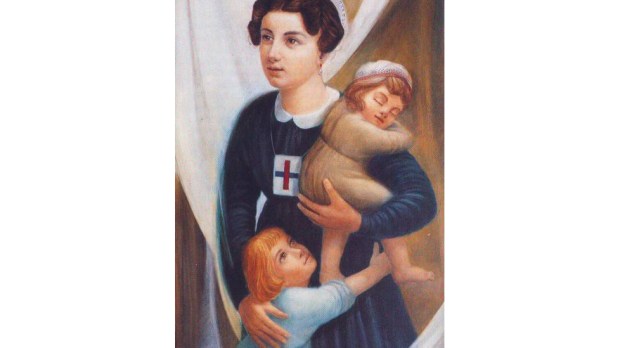There’s an old saying, dating back at least to St. Francis de Sales, that certain saints are to be admired but not imitated. We don’t encourage beautiful women to rub their faces with lye à la Rose of Lima, for example, nor do we suggest that missionaries pull a Francis of Assisi and appear before hostile Muslim leaders with the hopes of either converting them or being martyred.
It’s important to remember this when we discuss Blessed Elizabeth Canori Mora, a saint whose life can bring hope to women (and men) suffering from broken, unfaithful, and abusive marriages. Born in Rome in 1774, the aristocratic Elizabeth was blissfully happy when she first married Christopher Mora. He doted on her, particularly pleased to show her off to his friends. His pride soon became jealousy, though, and he began to limit her contact with the outside world. Before long, he grew disinterested and started to seek fulfillment in other areas.
The handsome, successful lawyer was soon a compulsive gambler and a lecherous drunk. He moved from mistress to mistress, all the while ridiculing his wife for her piety. As his excesses impoverished their family, Elizabeth sold her jewelry and even her wedding dress to feed their two daughters. All the while, Christopher became more and more abusive. For a time, he abandoned them entirely, leaving Elizabeth to support their two daughters alone. Eventually he returned, but his behavior was unchanged. And still Elizabeth prayed, loving her husband heroically despite his complete unworthiness.
For years, Elizabeth prayed for and loved the husband who could never deserve her. Between that and raising her children, she also made time to work as a seamstress, care for the sick, and serve the poor. She lived in the hope that her love would lead him to conversion. This hope was so powerful that she once told him, “It may seem unbelievable, but one day you will celebrate Mass for me!”
In the eyes of the world, then as now, Elizabeth was a deluded, battered woman. And yet her love and holiness reached out to the streets of Rome and into the depths of her heart. She had visions and uttered prophecies as well as visiting the sick and counseling married couples. A Third Order Trinitarian, Elizabeth would not retreat from the world. She chose instead to preach by her love, saying, “nobody can be saved all alone, and God has entrusted to everyone the responsibility of the salvation of others in order to carry out his project of love.”
Eventually even Christopher’s hard heart began to soften. As the exhausted and weak Elizabeth neared her death at the age of 50, he spent more time with her than he had in years. There was one last blow for Elizabeth to suffer, though: on the night she died, Christopher was out with his mistress. Returning home to find his wife gone, he was overcome by grief and remorse. He repented of his sins, ultimately entering the Franciscan order and being ordained a priest. If the holiness of Elizabeth’s life hadn’t been clear from her works of charity and contemplative spirit, his miraculous conversion would have been evidence enough to proclaim her sanctity to the world. Separated in life by sin and selfishness, Elizabeth and Christopher were finally united in Christ.
Elizabeth Mora’s witness isn’t a call to remain in an abusive relationship. She serves less as a model of how to live and more as a model of how to love. There are thousands of faithful Catholics whose hearts have been broken by abusive and unfaithful spouses. In cases of abuse, addiction, or adultery the Church permits spouses to separate, but the obligation to love one’s spouse and to work for his conversion and salvation remains.
Elizabeth Canori Mora is a powerful example of a love that transforms a victim into a survivor. She’s a model of holiness lived even after happily-ever-after goes sour. She’s a witness of unceasing prayer for the conversion of the one she loved. Her decision to stay with Christopher may not be one to be imitated, but her selflessness and love are certainly to be admired.
On February 5, the feast of Bl. Elizabeth Mora, let’s pray for reconciliation between spouses, for abandoned and abused spouses, and for husbands and wives to live in radical love for the sanctification of the other. If your marriage looks like Elizabeth Mora’s, know this: you are not alone. God sees you and loves you and in your pain he will draw you to himself and make you a saint if you let him. Blessed Elizabeth Canori Mora, pray for us!

